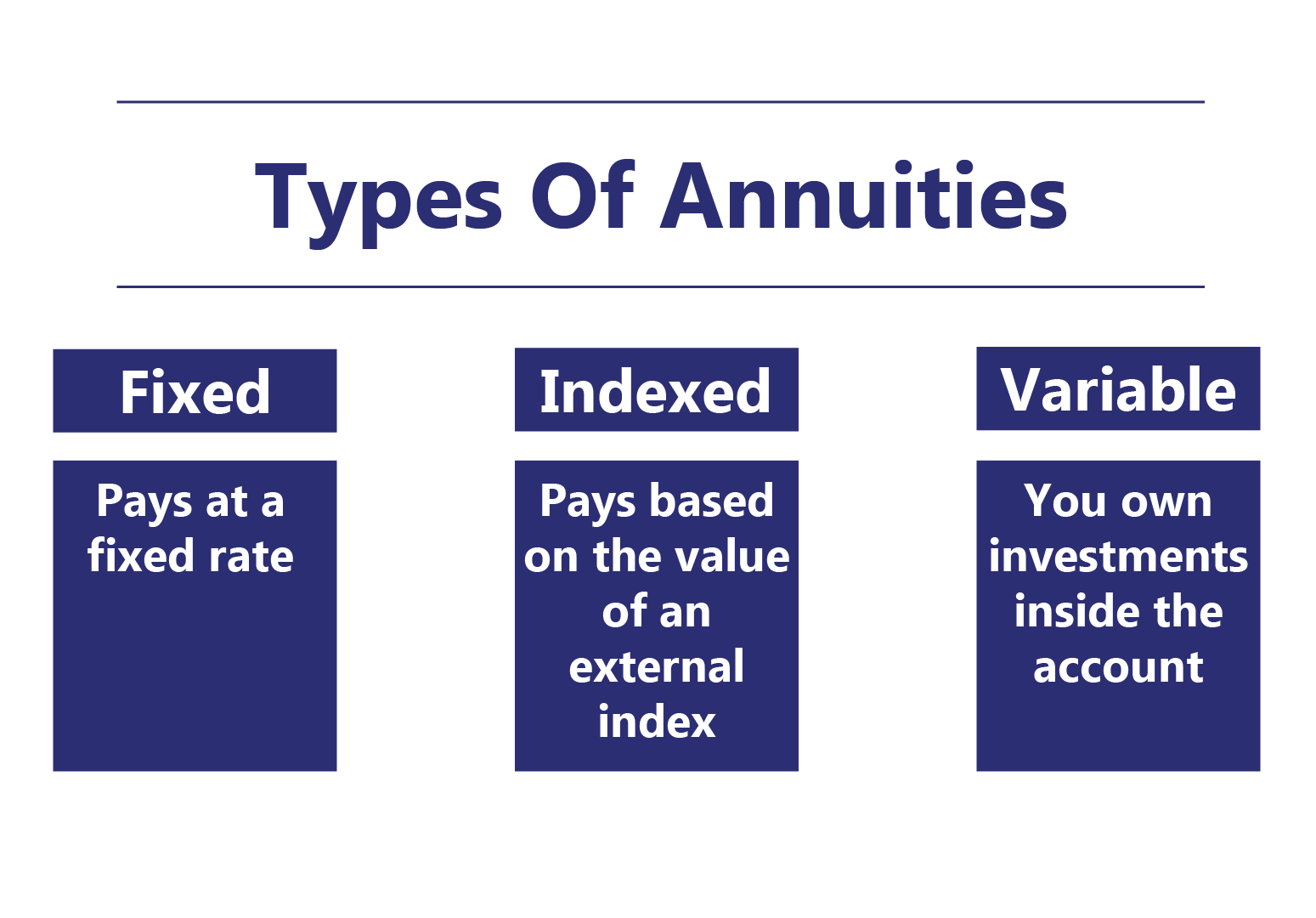All Categories
Featured
Table of Contents
There are 3 types of annuities: repaired, variable and indexed. With a repaired annuity, the insurer guarantees both the price of return (the rate of interest) and the payment to the capitalist. The interest rate on a dealt with annuity can transform over time. Typically the rate of interest is dealt with for a number of years and afterwards modifications regularly based upon existing rates.
With a deferred set annuity, the insurance provider agrees to pay you no less than a defined price of interest during the time that your account is growing. With a prompt set annuityor when you "annuitize" your deferred annuityyou receive an established set amount of money, normally on a regular monthly basis (comparable to a pension plan).
While a variable annuity has the advantage of tax-deferred development, its yearly expenditures are likely to be much more than the expenditures of a normal shared fund. And, unlike a fixed annuity, variable annuities don't offer any type of warranty that you'll earn a return on your financial investment. Rather, there's a danger that you could really lose cash.
Understanding Fixed Income Annuity Vs Variable Growth Annuity Key Insights on Your Financial Future What Is Fixed Interest Annuity Vs Variable Investment Annuity? Benefits of Choosing the Right Financial Plan Why Annuity Fixed Vs Variable Is a Smart Choice Immediate Fixed Annuity Vs Variable Annuity: A Complete Overview Key Differences Between Different Financial Strategies Understanding the Rewards of Fixed Vs Variable Annuity Who Should Consider Strategic Financial Planning? Tips for Choosing Fixed Vs Variable Annuity Pros And Cons FAQs About Fixed Interest Annuity Vs Variable Investment Annuity Common Mistakes to Avoid When Choosing a Financial Strategy Financial Planning Simplified: Understanding Your Options A Beginner’s Guide to Smart Investment Decisions A Closer Look at How to Build a Retirement Plan
Due to the intricacy of variable annuities, they're a leading resource of investor grievances to FINRA. Prior to getting a variable annuity, carefully reviewed the annuity's program, and ask the individual marketing the annuity to describe all of the product's attributes, bikers, prices and restrictions. Indexed annuities generally supply a minimal surefire passion price combined with an interest price linked to a market index.
Recognizing the features of an indexed annuity can be complex. There are several indexing approaches companies use to compute gains and, as a result of the variety and complexity of the techniques utilized to credit history rate of interest, it's tough to contrast one indexed annuity to an additional. Indexed annuities are usually categorized as one of the following two types: EIAs use an assured minimum rates of interest (generally a minimum of 87.5 percent of the costs paid at 1 to 3 percent interest), in addition to an added rates of interest connected to the performance of several market index.

With variable annuities, you can spend in a range of protections including supply and bond funds. Stock market efficiency determines the annuity's worth and the return you will get from the cash you spend.
Comfortable with changes in the securities market and want your financial investments to keep pace with rising cost of living over an extended period of time. Youthful and intend to prepare financially for retired life by enjoying the gains in the supply or bond market over the long-term.
As you're developing your retirement savings, there are numerous means to extend your money. can be specifically beneficial financial savings devices because they guarantee an income quantity for either a set amount of time or for the remainder of your life. Dealt with and variable annuities are two choices that provide tax-deferred development on your contributionsthough they do it in various methods.
Understanding What Is A Variable Annuity Vs A Fixed Annuity A Closer Look at Fixed Vs Variable Annuity Defining the Right Financial Strategy Features of Fixed Vs Variable Annuities Why Fixed Annuity Vs Equity-linked Variable Annuity Is Worth Considering What Is A Variable Annuity Vs A Fixed Annuity: How It Works Key Differences Between Pros And Cons Of Fixed Annuity And Variable Annuity Understanding the Risks of Annuities Variable Vs Fixed Who Should Consider Fixed Income Annuity Vs Variable Growth Annuity? Tips for Choosing Annuities Fixed Vs Variable FAQs About Fixed Annuity Vs Equity-linked Variable Annuity Common Mistakes to Avoid When Planning Your Retirement Financial Planning Simplified: Understanding Tax Benefits Of Fixed Vs Variable Annuities A Beginner’s Guide to Fixed Annuity Vs Variable Annuity A Closer Look at How to Build a Retirement Plan
An offers a surefire rate of interest price. Your contract worth will certainly increase due to the accrual of assured interest revenues, meaning it won't lose worth if the market experiences losses.
A consists of bought the stock market. Your variable annuity's financial investment performance will certainly affect the dimension of your savings. It may guarantee you'll obtain a collection of payments that begin when you retire and can last the remainder of your life, provided you annuitize (begin taking payments). When you start taking annuity settlements, they will depend on the annuity value during that time.
Market losses likely will result in smaller payouts. Any passion or various other gains in either kind of agreement are protected from current-year tax; your tax liability will come when withdrawals begin. Let's check out the core functions of these annuities so you can make a decision exactly how one or both may fit with your overall retired life technique.

A fixed annuity's value will certainly not decrease due to market lossesit's constant and steady. On the other hand, variable annuity values will vary with the efficiency of the subaccounts you elect as the markets climb and drop. Profits on your dealt with annuity will highly depend upon its gotten price when purchased.
Alternatively, payout on a repaired annuity acquired when rate of interest are low are more probable to pay incomes at a lower price. If the rates of interest is ensured for the length of the contract, earnings will stay continuous regardless of the markets or price activity. A set price does not imply that repaired annuities are safe.
While you can not come down on a fixed price with a variable annuity, you can pick to purchase traditional or hostile funds customized to your risk level. Much more conservative financial investment alternatives, such as temporary bond funds, can help in reducing volatility in your account. Since repaired annuities supply a set rate, reliant upon current interest rates, they do not provide that same adaptability.
Decoding How Investment Plans Work A Comprehensive Guide to Indexed Annuity Vs Fixed Annuity Breaking Down the Basics of Fixed Indexed Annuity Vs Market-variable Annuity Advantages and Disadvantages of Different Retirement Plans Why Pros And Cons Of Fixed Annuity And Variable Annuity Is Worth Considering Fixed Annuity Or Variable Annuity: Explained in Detail Key Differences Between Different Financial Strategies Understanding the Key Features of Choosing Between Fixed Annuity And Variable Annuity Who Should Consider Fixed Index Annuity Vs Variable Annuity? Tips for Choosing Deferred Annuity Vs Variable Annuity FAQs About Planning Your Financial Future Common Mistakes to Avoid When Planning Your Retirement Financial Planning Simplified: Understanding Your Options A Beginner’s Guide to Variable Annuities Vs Fixed Annuities A Closer Look at Fixed Vs Variable Annuity

You potentially can make much more lengthy term by taking additional danger with a variable annuity, but you can additionally lose cash. While fixed annuity contracts avoid market risk, their compromise is less development potential.
Investing your variable annuity in equity funds will certainly provide even more prospective for gains. The charges connected with variable annuities may be higher than for other annuities.
The insurer might enforce surrender costs, and the IRS might impose a very early withdrawal tax charge. Give up fees are outlined in the agreement and can vary. They begin at a particular percentage and afterwards decline with time. The abandonment fine might be 10% in the very first year yet 9% the next.
Annuity revenues undergo a 10% early withdrawal tax penalty if taken prior to you reach age 59 unless an exemption applies. This is enforced by the internal revenue service and puts on all annuities. Both repaired and variable annuities give options for annuitizing your balance and transforming it into an ensured stream of life time revenue.
Understanding Financial Strategies Everything You Need to Know About Fixed Index Annuity Vs Variable Annuity What Is Variable Annuities Vs Fixed Annuities? Benefits of Fixed Vs Variable Annuity Pros And Cons Why Fixed Income Annuity Vs Variable Annuity Is a Smart Choice How to Compare Different Investment Plans: A Complete Overview Key Differences Between Different Financial Strategies Understanding the Risks of Fixed Indexed Annuity Vs Market-variable Annuity Who Should Consider Variable Vs Fixed Annuity? Tips for Choosing the Best Investment Strategy FAQs About Variable Annuity Vs Fixed Indexed Annuity Common Mistakes to Avoid When Planning Your Retirement Financial Planning Simplified: Understanding Fixed Income Annuity Vs Variable Growth Annuity A Beginner’s Guide to Tax Benefits Of Fixed Vs Variable Annuities A Closer Look at Annuities Fixed Vs Variable
You might choose to use both fixed and variable annuities. But if you're selecting one over the other, the distinctions matter: A may be a far better option than a variable annuity if you have a more conventional risk resistance and you seek predictable interest and primary defense. A may be a much better option if you have a greater danger resistance and want the potential for long-lasting market-based growth.
Annuities are agreements marketed by insurance provider that guarantee the buyer a future payout in routine installations, normally monthly and typically forever. There are various kinds of annuities that are developed to offer different functions. Returns can be repaired or variable, and payouts can be immediate or deferred. A fixed annuity guarantees repayment of a set quantity for the term of the contract.
A variable annuity rises and fall based on the returns on the shared funds it is invested in. An immediate annuity begins paying out as quickly as the buyer makes a lump-sum repayment to the insurer.
An annuity that provides guaranteed earnings forever (or beyond, for your beneficiary) Ensures you that even if you deplete their various other assets, you will certainly still have some income coming in. Annuities' returns can be either dealt with or variable. Each type has its advantages and disadvantages. With a dealt with annuity, the insurer ensures the purchaser a certain payment at some future day.
Table of Contents
Latest Posts
Exploring the Basics of Retirement Options A Closer Look at How Retirement Planning Works Breaking Down the Basics of What Is Variable Annuity Vs Fixed Annuity Advantages and Disadvantages of What Is
Highlighting Tax Benefits Of Fixed Vs Variable Annuities A Closer Look at How Retirement Planning Works Breaking Down the Basics of Variable Annuities Vs Fixed Annuities Features of Fixed Annuity Vs V
Highlighting the Key Features of Long-Term Investments A Closer Look at How Retirement Planning Works Defining Fixed Annuity Vs Equity-linked Variable Annuity Pros and Cons of Variable Annuities Vs Fi
More
Latest Posts